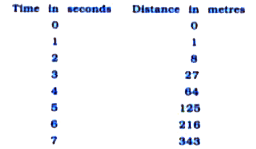An object of mass 100 kg is accelerated uniformly from a velocity of 5 ms−1 to 8 m s−1 in 6 s of the object.Find the magnitude of the force exerted on the object. Solution in Gujrati
Here,m=100kg u= 5 ms−1
v=8 ms−1,t=6s
Initial momentum P1=μ=100×5
500 kg ms−1
Final momentum P2=mv=100×8
800 kg ms−1
Force exerted on the object.
F=ma (v−ut)=100(8−56)=(300)(6)=50N
Initial momentum is 500 kg ms−1 final momentum is 800 kg ms−1.The magnitude of force exerted on the object is 50N
Topper's Solved these Questions
- BOOK - KUMAR PRAKASHANCHAPTER - FORCE AND LAWS OF MOTIONEXERCISE - Additional Exercise4videos
FORCE AND LAWS OF MOTION
- BOOK - KUMAR PRAKASHANCHAPTER - FORCE AND LAWS OF MOTIONEXERCISE - Additional Numericals for Practice18videos
FORCE AND LAWS OF MOTION
- BOOK - KUMAR PRAKASHANCHAPTER - FORCE AND LAWS OF MOTIONEXERCISE - QUESTIONS AND ANSWERS(Solve the following examples/numericals :)8videos
FORCE AND LAWS OF MOTION
- BOOK - KUMAR PRAKASHANCHAPTER - GRAVITATIONEXERCISE - ACTIVITY 10.42videos
GRAVITATION
Similar Questions
The following is the distance-time table of an object in motion:

(a)What conclusion can you draw about the acceleration ?Is it constant. Increasing decreasing ir zero? (b)What do you infer about the force acting on the object?02:27View SolutionThe velocity of an object of mass 50 kg increases from 3 ms−1 to 12 ms−1. What will be the force required for this?
03:39View SolutionA constant force acts on an object of mass 5kg for a duration of 2s.It increases the object's velocity from 3 ms−1 to 7 ms−1.Find the magnitude of the applied force .Now if the force was applied for a duration of 5s,What would be the final velocity of the object ?
04:48View SolutionTake an empty plastic bottle . Close the mouth of the bottle with an airtight stopper . Put it in a bucket filled with watere . The bottle floats .
Push the bottle into the water. You feel an upward push. Try to push it further down. You will find it difficult to push deeper and deeper. Water exerts a force on the bottle in upward direction. Now release the bottle. It bounces back to the surface.
Does the force due to the gravitational attraction of the earth act on this bottle? If so, why doesn't the bottle stay immersed in water after it is released ?05:10View SolutionAn object of mass 100kg is accelerated uniformly from a velocity of 5m/s to 8m/s in 6s. Calculate the initial and final momentum of the object. Also, find the magnitude of the exerted on the object.
02:49View Solution100 kg द्रव्यमान की एक वस्तु का वेग समान त्वरण से चलते हुए 6 s में 5ms−1 से8ms−1 हो जाता है | वस्तु के पहले और बाद के संवगो की गणना करें | उस बल के परिमाण की गणना करें जो उस वस्तु रैप आरोपित है |
View Solution100 kg द्रव्यमान की एक वस्तु का वेग समान त्वरण से चलते हुए 6.0 s में 5 m /s से 8 m /s हो जाता है। वस्तु के पहले और बाद में संवेगों की गणना करें । उस बल के परिमाण की गणना करें जो उस वस्तु पर आरोपित है।
02:26View Solution20 kg द्रव्यमान की वस्तु पर लगनेवाला कोई बल इसके वेग को 5 m/s से 2 m/s कर देता है | बल द्वारा किए गए कार्य की गणना करें |
02:53View SolutionAn object of mass 100 kg is accelerated uniformly from a velocity of 5ms−1 to 8ms−1 in 6 s. Calculate the initial and final momentum of the object. Also, find the magnitude of the force exerted on the object.
02:53View SolutionAn object of mass 100 kg is accelerated uniformly from a velocity of 5ms−1 to 8ms−1 in 6 s . Calculate the initial and final momentum of the object . Also find the the magnitude of the force exerted on the object.
02:53View SolutionAn object of mass 100kg is accelerated uniformly from a velocity of 5m/s to 8m/s in 6s. Calculate the initial and final momentum of the object. Also, find the magnitude of the force exerted on the object.
02:27View SolutionAn object of mass 100 kg is accelerated uniformly from a velocity of 5 ms^(-1) to 8 ms^( -1) in 6s. Calculate the initial and final momentum of the object. Also find the force exerted on the object.
03:20View SolutionAn object of mass 100 kg is accelerated uniformly from a velocity of 5ms−1 to 8ms−1 in 6 s. Calculate the initial and final momentum of the object. Also, find the magnitude of the force exerted on the object.
View SolutionAn object of mass 100 kg is accelerated uniformly from a velocity of 5ms−1 to8ms−1 in 6s. Calculate the initial and final momentum of the object. Also find the force exerted on the object.
View SolutionAn object of mass 100kg is accelerated uniformly from a velocity of 5m/s to 8m/s in 6s. Calculate the initial and final momentum of the object. Also, find the magnitude of the force exerted on the object.
View Solution

